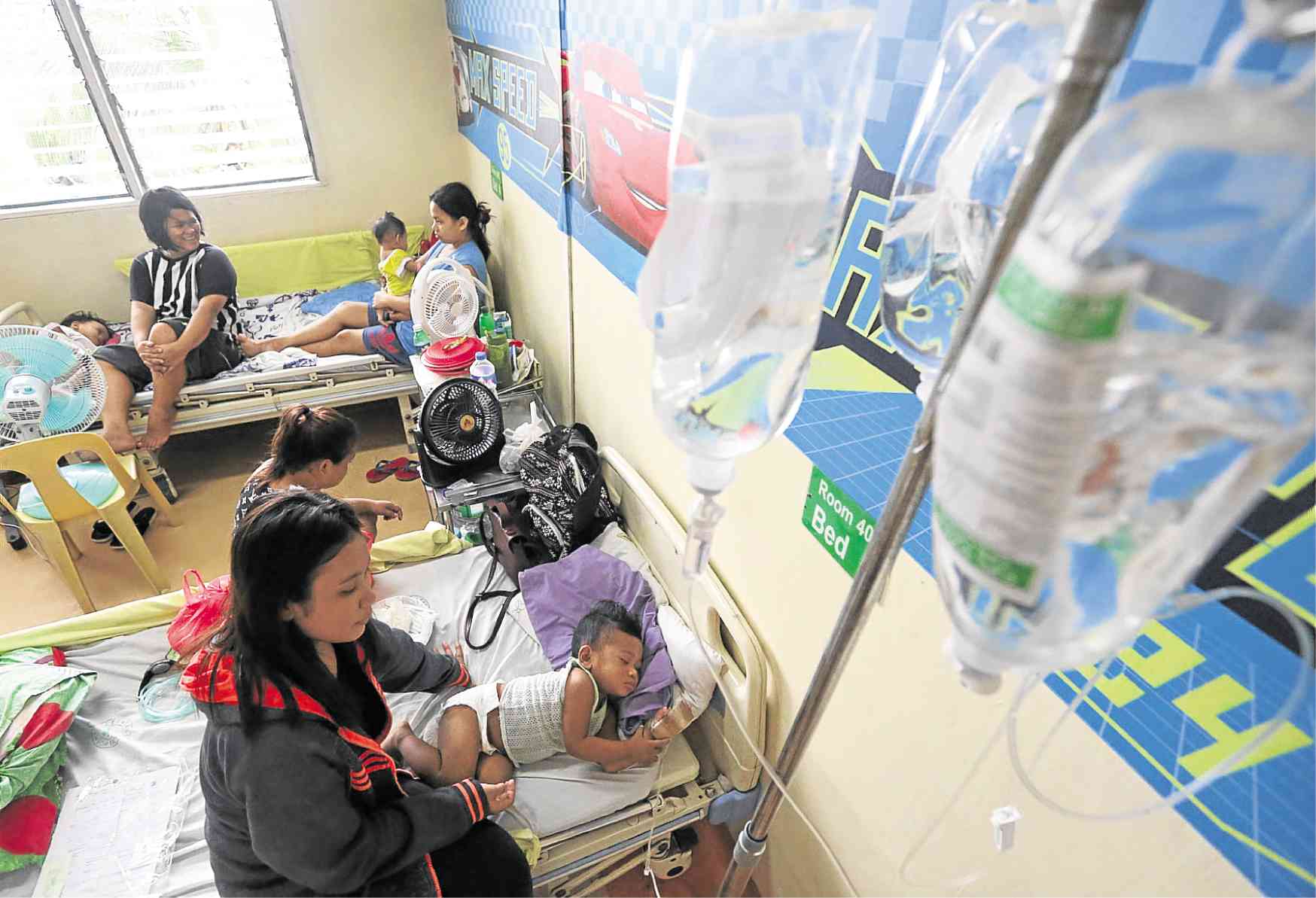Doctors’ group wants vaccine scaremongers penalized

MEASLES OUTBREAK A toddler, watched over by his mother, is among the children at the San Lazaro Hospital in Manila who contracted measles, a preventable disease that is claiming the lives of a growing number of Filipinos amid the public’s fear of vaccines. —MARIANNE BERMUDEZ
A nonprofit group of medical practitioners urged lawmakers on Tuesday to draft a law that would penalize people who spread false information, particularly on public health services like vaccination, given its adverse impact on the country’s well-being.
“[T]here ought to be a law” against those who would undermine public trust in vaccines given that the Philippines has the world’s third highest measles incidence, according to the Philippine Foundation for Vaccination (PFV).
According to its website, PFV is a nonstock, nonprofit organization advocating “the promotion of vaccination as essential to disease prevention, especially among infants and children.”
Its executive director, Dr. Lulu Bravo, said individuals or groups that spread false information were destroying the health of the people.
“It’s like libel, but worse since the results are disastrous. In libel, only one person may be affected. With this, hundreds of thousands get sick, become disable or die,” Bravo told the Inquirer.
Article continues after this advertisementThe World Health Organization (WHO) cited “misinformation about vaccines and the low awareness about the need to vaccinate” as reasons for the low vaccination coverage in countries that recorded a surge in measles.
Article continues after this advertisementAccording to the Department of Health (DOH), 533 people, mostly children, had died of measles as of July 13, from only 103 in the first half of 2018.
During the period, 39,184 measles cases were recorded across the country, triple the number last year.
Dengvaxia scare
The DOH earlier attributed the spike to low immunization coverage rate, which fell to 40 percent. To prevent the spread of measles, a community’s coverage rate should be 95 percent.
Health officials noted that the drop in the immunization rate arose from parents becoming afraid of having their children vaccinated due to the controversy surrounding the use of the dengue vaccine Dengvaxia.
The Public Attorney’s Office further stoked parents’ fears by insisting that a number of children who had been inoculated with Dengvaxia had died due to the vaccine, despite medical opinion to the contrary.
Bravo said fearmongers should not be allowed to go scot-free as “their lies wrought havoc and cost the lives” of many people, especially children.
Dr. Edsel Salvana, an infectious disease specialist, said accountability should be exacted on those who were “complicit in manufacturing and spreading fake news, fanned the hysteria and contributed to the undermining of vaccine confidence” in the country.
Public distrust
Health officials in Central Luzon, Cagayan Valley, Calabarzon and Western Visayas also attributed the low vaccination coverage in the regions to public distrust in the government’s immunization program.
At least 61 percent or 4,111 people with measles in Central Luzon this year had not been vaccinated, said Dr. Jessie Fantone, chief of the DOH epidemiological unit in the region.
Measles cases from January to Aug. 17 rose to 6,727, from 532 in the same period in 2018. At least 131 people had died in the past seven months.
Health workers in Calabarzon (Cavite, Laguna, Batangas, Rizal, Quezon) region were taking “supportive measures” to arrest the rising incidence of the disease.
Eduardo Janairo, regionalhealth director, said the number increased to 8,943 from January to Aug. 24. Of this figure, 168 died.
Conflict areas
The DOH recorded 1,133 cases in the same period last year.
As of last month, Janairo said the department had achieved only 62 percent of the targeted population for vaccination.
He said health workers were also having a hard time working in areas affected by insurgency, like General Nakar town in Quezon province.
Grace Santiago, Quezon health officer, said 1,036 cases were reported from January to Aug. 24, or four times the 251 cases in the same period last year.
Eleven people have died of measles so far this year.
In Bicol, despite the stepped-up vaccination drive, 15 people have died, according to the Center for Health and Development.
The Regional Epidemiology Surveillance Unit reported 1,336 measles cases from January to Aug. 23, from only 196 cases and six deaths in the same period last year.
Eightfold increase
Dr. Rita Mae C. Ang-Bon, head of the DOH Family Health Cluster in Bicol, said immunization was going on for schoolchildren from Kindergarten to Grade 7.
Western Visayas saw an eightfold increase in the number of measles cases.
From January to Aug. 25, the DOH regional office reported 2,807 cases, up from 297, and eight deaths.
Dr. Mary Jane Juanico, child health program coordinator, attributed the surge in cases to the high vaccination hesitancy rate leading to a low immunization rate.
Among the 2,807 reported cases, 45.5 percent were not immunized while 35.3 percent were immunized.
Two doses, booster
Ideally, children aged below 23 months old should have two doses of measles vaccine. Booster injections are administered for children in Grades 1 and 7.
While there was no confirmed death attributed to Dengvaxia in Western Visayas, many parents and children have refused or avoided immunization for other diseases offered by government health centers.
“Mothers refused to have their children vaccinated fearing that their children will die,” said a rural health physician, who asked not to be named.
They refused both vaccine injections and oral dosages.
Dr. Ernell Tumimbang, Negros Occidental health officer, said the increase in measles cases began in August last year from a relatively low number in the first half of 2018.
Public trust in the government’s immunization program could still be restored, said Dr. Rio Magpantay, DOH director for Cagayan Valley. “With proper advocacy, we can [combat measles],” he told the Inquirer in a text message.—With reports from Tonette Orejas, Villamor Visaya Jr., Maricar Cinco, Delfin Mallari Jr., Michael Jaucian, Nestor Burgos Jr. and Carla Gomez